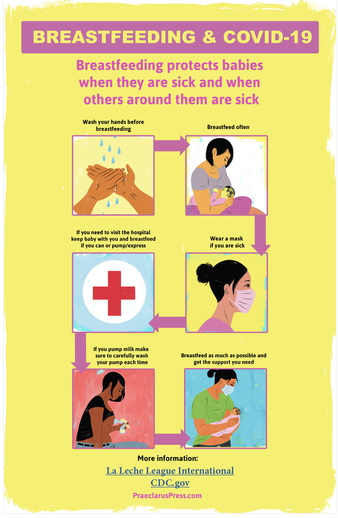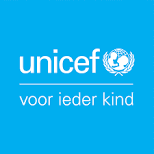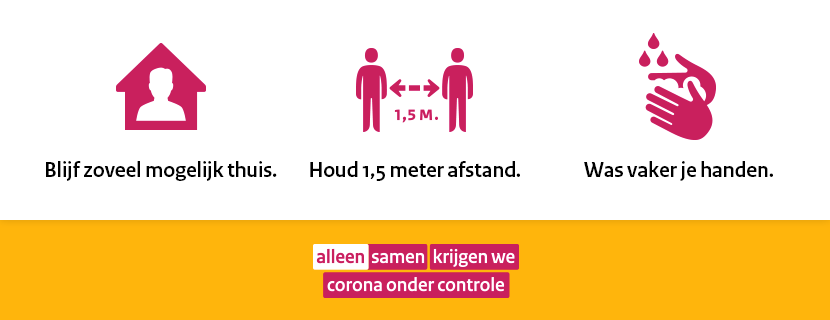
LACTATIEKUNDIGE ZORG EN CORONA
LACTATIEKUNDIGE ZORG EN DE MAATREGELEN VAN DE OVERHEID
Het uitoefenen van alle vormen van contactberoepen wordt verboden, voor zover er geen 1,5 m afstand tot de klant gehouden kan worden. Hierbij kunt u denken aan masseurs, kappers, nagelstylisten, escort-services en rijinstructeurs. Er wordt een uitzondering gemaakt voor de behandeling van (para)medische beroepen, mits daar een individuele medische indicatie voor bestaat en de beoefenaar alle hygiënevereisten kan naleven.
Kunnen paramedici, zoals fysiotherapeuten, nog zorg blijven bieden?
Ja, maar deze zorg moet op afstand uitgevoerd worden, bijvoorbeeld telefonisch of met videobellen. In situaties waarin zorg echt niet op afstand kan worden geboden maar de zorg wel strikt noodzakelijk is, kan ook fysieke (face-to-face) zorg worden geboden. Bijvoorbeeld in de praktijk, bij de patiënt thuis of op een andere locatie. Hierbij moeten wel de hygiëne maatregelen worden opgevolgd (ook door patiënt).
De paramedicus bepaalt of de zorg strikt noodzakelijk is en stemt dat als het nodig is af met de betrokken (huis)arts. Als een patiënt verkoudsheidsklachten of koorts heeft en de zorg moet toch geleverd worden, dan moeten daarvoor de richtlijnen van het RIVM voor de betreffende zorgsector worden gevolgd. Zorgaanbieders moeten onderling verdere afspraken maken, zodat noodzakelijke zorg met zo min mogelijk risico voor patiënt en behandelaar geboden kan blijven worden.
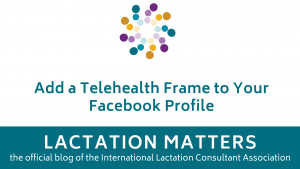 ILCA
ILCA
“Supporting lactation is important to human health at all times, but especially during times of emergency. As skilled lactation providers around the globe support families during the COVID-19 epidemic, ILCA is working to provide resources, guidelines, and communication tools”
WHO
“All international world health guidelines agree: Breastfeeding should continue and be supported during the COVID-19 epidemic, with appropriate precautions.”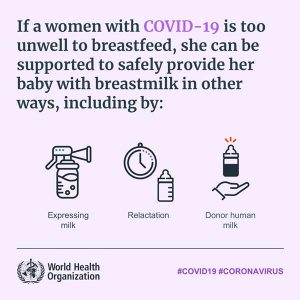
Can I touch and hold my newborn baby if I have COVID-19? Yes.
Close contact and early, exclusive breastfeeding helps a baby to thrive.
You should be supported to Breastfeed safely, with good respiratory hygiene.
- Hold your newborn skin-to-skin;
- Share a room with your baby;
- You should wash your hands before and after touching your baby;
- Keep all surfaces clean.
Can I breastfeed if I have COVID-19? Yes.
Women with COVID-19 can breastfeed if they wish to do so.
They should:
- Practice respiratory hygieneduring feeding;
- Wearing a maskwhere available;
- Wash hands before and after touching the baby;
- Routinely clean and disinfect surfaces they have touched.
I have COVID-19 and am too unwell to breastfeed my baby directly. What can I do?
If you are too unwell to breastfeed your baby due to COVID-19 or other complications, you should be supported to safely provide your baby with breastmilk in a way possible, available, and acceptable to you.
This could include:
- Expressing milk;
- Relactation;
- Donor human milk.
Op zoek naar onderzoeken?
The International Society for Research in Human Milk and Lactation | Evidence-based statements on breastfeeding and COVID-19
The mission of ISRHML is to create and disseminate research on human milk and lactation. During this unprecedented time, ISRHML leaders have come together to assemble the rapidly emerging evidence on human milk, lactation and COVID-19. We are sharing this information with our members to help to coordinate collaborative research efforts and educate researchers, practitioners and families. A summary of current evidence can be found here, where we will continue to post updates as the evidence evolves.
